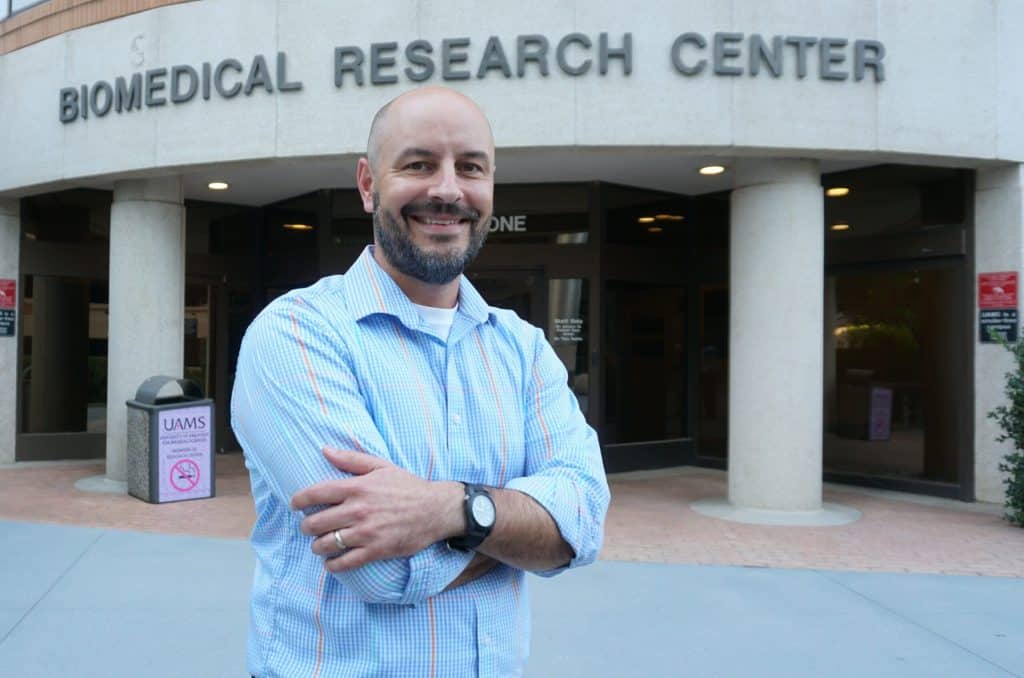Oct. 25, 2022 | LITTLE ROCK — The University of Arkansas for Medical Sciences (UAMS) will use a $7.9 million National Institutes of Health (NIH) grant to expand its infectious disease research capacity and establish a Pandemic Response and Public Health Laboratory by renovating existing research space.
The renovation will create about 9,900 square feet of additional research space on the first floor of Biomedical Research Center Building One. The extra space will be realized through a redesign that repurposes an atrium, large diagonal hallways, and converts offices to laboratories.

UAMS’ Daniel Voth, Ph.D., who is leading the project, said the renovation is expected to begin in mid-2024 and be completed in 2025. It will include new Biosafety Level-3 space, which is equipped to handle highly infectious pathogens transmitted by air. It will better prepare UAMS for future pandemic responses, create new opportunities for collaboration and help UAMS recruit new infectious disease researchers, he said.
The Pandemic Response and Public Health Laboratory will be available for a rapid response to the next outbreak. It will also be immediately available to process human samples for COVID-19 studies and population health studies in the state and the mid-South.
“If a researcher in Northwest Arkansas has human serum samples from their populations there, they could send them to us for safe processing, or they could come process them here,” said Voth, professor and chair of the College of Medicine Department of Microbiology and Immunology.
UAMS has research programs that study tuberculosis, plague, COVID-19 and Q fever in a small Biosafety Level-3 facility. The renovations will expand those programs and enable new pathogen studies that will benefit Arkansas and the global community.
“While we’ve been able to conduct some great collaborative research on COVID-19, we are also limited because we are so pinched for space,” Voth said. “We get a number of collaboration requests from other research institutions that we can’t accommodate because we don’t have enough Biosafety Level-3 facility space.”
Voth also said the grant award highlights that infectious disease research is a priority for the NIH and UAMS.
Shuk-Mei Ho, Ph.D., UAMS vice chancellor for Research and Innovation, said the renovation will bring UAMS closer to becoming a top three U.S. News & World Report-ranked academic medical center in the Southeast Region — a major goal of UAMS’ Vision 2029 strategic plan.
“What really excites me about it is its emphasis on expanding our ability to do safe and secure research on infections,” Ho said. “The additional capacity will help us get on top of some of the emerging diseases and antibiotic-resistant pathogens, and we can make a big impact on the health of our state.”
Voth said the grant application benefited greatly from significant pledges of support from UAMS Chancellor Cam Patterson, M.D., MBA; Provost and Chief Academic Officer Stephanie Gardner, Pharm.D., Ed.D.; College of Medicine Dean Susan Smyth, M.D., Ph.D.; and Ho.
The project’s team leaders also include:
- Christine Simecka, DVM, facility manager
- Mohamed Elasri, Ph.D., associate vice chancellor for Research and Innovation
- Kate Loyd, biosafety officer and Biosafety Level-3 facility manager
- Jonathan Davies, project manager
- Al Graham, director of UAMS Planning, Design and Construction
The C-06 grant, 1C06OD032002-01A1, was awarded by the NIH Office of the Director.
